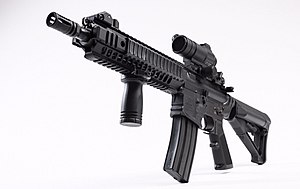
New Delhi: What was at first considered a purely diplomatic move has now shaped into an arms deal with the UAE firm Caracal International as the lowest bidder “L-1” in September 2018, which is expected to bag the contract that is to be fast tracked.
As and when the final deal is inked, Indian Army could finally get its hands on new close quarter battle (CQB) carbines for immediate operational requirements. The proposal has been in the works since 2017.
The Defence Acquisition Council (DAC) could soon decide on the signing of the contract with the UAE firm and it would be the first time that Indian forces will start using weapon from a Gulf nation which itself is one of the largest importers of defence equipment.
The carbines will replace the outdated and ageing 9mm British Sterling 1A1 sub machine guns that are in service.
After years of attempts to replace them, the Army had in 2017 decided to opt for Fast Track Procurement (FTP) of 93,895 new carbines against an overall demand of 3.5 lakh such weapons.
The contract for the Caracal’s CAR 816 had run into rough weather over a number of issues including costs and complaints from other bidders.
The CQB Carbines, with short barrel, are meant for operations in urban settings and room interventions, especially in counter terrorism operations like in Jammu and Kashmir.
A global tender for procurement of 44,618 CQB Carbines was issued in 2011 wherein four companies — Israel’s IWI, Italian Beretta and American firms Colt and Sig Sauer participated.
However, only IWI qualified as the other contenders could not meet the qualitative requirements pertaining to night vision mounting system, sources said.
But the Ministry of Defence did not procure the carbines from IWI saying it had become a single vendor case, which is not allowed as per procurement manual.
It is estimated that the overall demand would be over five lakh if one takes into account the armed forces, the central armed police forces and the state police forces.
The request for proposal (RFP) was expected within a year of issuing RFI, which is still awaited.
As the General Manager, Caracal, Hamad Al Ameri, said the future of small arms will depend on the ability to plan and experiment in context of future realities along with instinctive innovation in moments of pressure and sudden yet critical disruption.
As Hamad Al Ameri explained that using advanced machining concepts, additive manufacturing, innovative moulding technologies, state of the art heat and surface treatment, and no-compromise quality strategies – the production of next-generation firearms is being built on a foundation of scenario planning and alternative realities of the future battlefield at CARACAL’s state-of-the-art facility in Abu Dhabi.
Whether its redesign in the human soldier weapon interface, the fundamental premise remains the same: firing bigger payloads with less weight to carry around. That is more with less.
“We are looking at a future where soldiers are equipped with small arms that are designed as the linchpins of combat forces capable of greater lethality than ever before. The ability to fire more rounds, and downrange with unerring accuracy, impervious to any weather or terrain in the natural world, overpowering anything any adversary has at their disposal – in short, we are seeking the small arms’ silver bullet,” he said.
The soldier of the future will be integrated into advanced communication systems and his weapons need to be part of that integration with advanced optics, smart ammunition and remote diagnostics. This will close the loop with applications of small arms in unmanned vehicles, both in the air and on the ground.
These are taken into account at Caracal’s state-of-the-art facility in Abu Dhabi.








